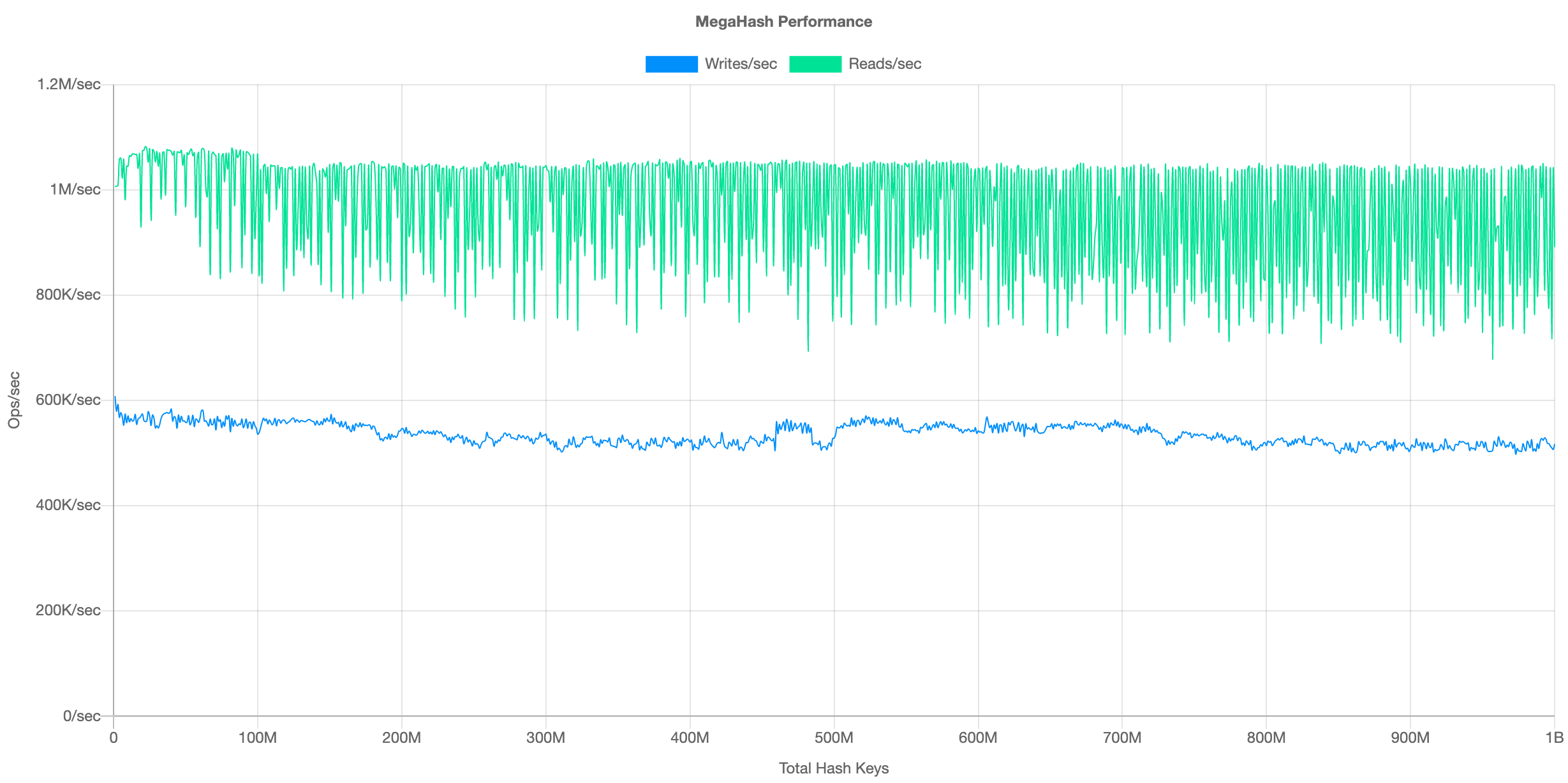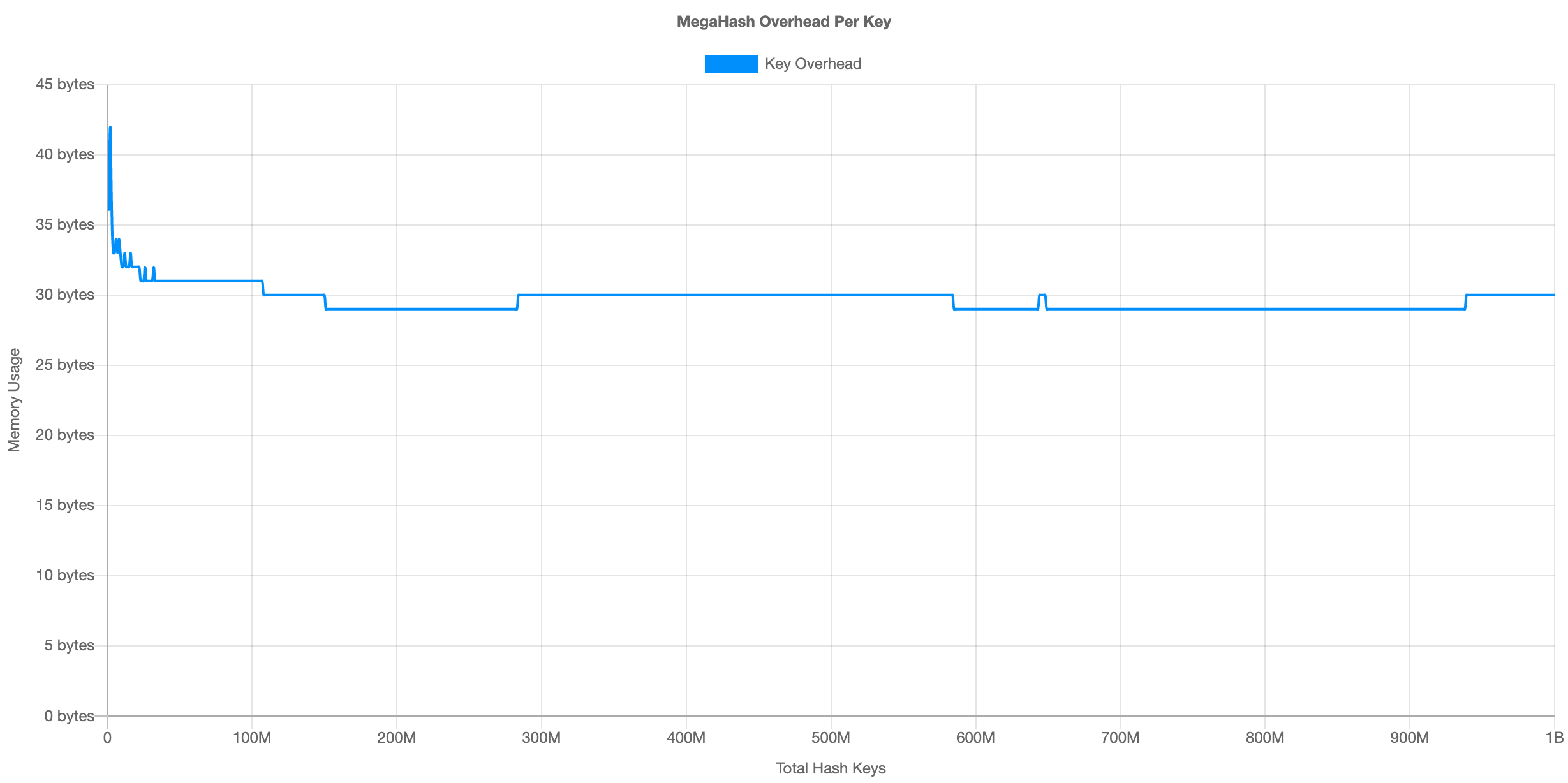
Security News
pnpm 10.0.0 Blocks Lifecycle Scripts by Default
pnpm 10 blocks lifecycle scripts by default to improve security, addressing supply chain attack risks but sparking debate over compatibility and workflow changes.
MegaHash is a super-fast C++ hash table with a Node.js wrapper, capable of storing over 1 billion keys, has read/write speeds above 500,000 keys per second (depending on CPU speed, key/value size, and total keys in hash), and low memory overhead (~30 bytes per key). However, please note that there are some caveats.
I do know of the hashtable module on NPM, and have used it in the past. The problem is, that implementation stores everything on the V8 heap, so it runs into serious performance dips with tens of millions of keys. Also, it seems like the author may have abandoned it (open issues are going unanswered), and it doesn't compile on Node v12+.
See the chart below, which fills up a hash with 1 billion keys while measuring both read and write performance. This is an "ideal" case, with very small keys and values, simply to illustrate the maximum possible speed and hash overhead:

The average writes/sec was 535,261, and reads/sec was 961,852. This was on an AWS EC2 c5a.16xlarge VM. The performance is fairly consistent regardless of the total number of keys. As for memory usage, here is the chart:

At 1 billion keys, MegaHash requires about 27.4 GB memory overhead. This divides out to approximately 30 bytes per key. Here is the overhead per key illustrated:

For more benchmark results, see the table below:
| Test Description | Record Size | Hardware | OS | Link |
|---|---|---|---|---|
| Mac Standard 100M Keys | 96 - 128 chars | 2020 MacBook Pro 16" | macOS 10.15.7 | View Results |
| Mac Ideal 100M Keys | 1 char | 2020 MacBook Pro 16" | macOS 10.15.7 | View Results |
| Linux Standard 100M Keys | 96 - 128 chars | AWS EC2 c5a.16xlarge | AWS Linux 2021 | View Results |
| Linux Standard 100M Keys | 96 - 128 chars | AWS EC2 c5.metal | AWS Linux 2021 | View Results |
| Linux Ideal 1B Keys | 1 char | AWS EC2 c5a.16xlarge | AWS Linux 2021 | View Results |
All results were produced using the included Benchmark Script.
Use npm to install the module locally:
npm install megahash
You will need a C++ compiler toolchain to build the source into a shared library:
| Platform | Instructions |
|---|---|
| Linux | Download and install GCC. On RedHat/CentOS, run sudo yum install gcc gcc-c++ libstdc++-devel pkgconfig make. On Debian/Ubuntu, run sudo apt-get install build-essential. |
| macOS | Download and install Xcode. You also need to install the XCode Command Line Tools by running xcode-select --install. Alternatively, if you already have the full Xcode installed, you can find them under the menu Xcode -> Open Developer Tool -> More Developer Tools.... This step will install clang, clang++, and make. |
| Windows | Install all the required tools and configurations using Microsoft's windows-build-tools using npm install --global --production windows-build-tools from an elevated PowerShell or CMD.exe (run as Administrator). |
Once you have that all setup, use require() to load MegaHash in your Node.js code:
const MegaHash = require('megahash');
Here is a simple example:
var hash = new MegaHash();
hash.set( "hello", "there" );
console.log( hash.get("hello") );
hash.delete("hello");
hash.clear();
To add or replace a key in a hash, use the set() method. This accepts two arguments, a key and a value:
hash.set( "hello", "there" );
hash.set( "hello", "REPLACED!" );
To fetch an existing value given a key, use the get() method. This accepts a single argument, the key:
var value = hash.get("hello");
The following data types are supported for values:
Buffers are the internal type used by the hash, and will give you the best performance. This is true for both keys and values, so if you can pass them in as Buffers, all the better. All other data types besides buffers are auto-converted. Example use:
var buf = Buffer.allocSafe(32);
buf.write("Hi");
hash.set( "mybuf", buf );
var bufCopy = hash.get("mybuf");
It should be noted here that memory is copied when it enters and exits MegaHash from Node.js land. So if you insert a buffer and then retrieve it, you'll get a brand new buffer with a fresh copy of the data.
Strings are converted to buffers using UTF-8 encoding. This includes both keys and values. However, for values MegaHash remembers the original data type, and will reverse the conversion when getting keys, and return a proper string value to you. Example:
hash.set( "hello", "there" );
console.log( hash.get("hello") );
Keys are returned as strings when iterating using nextKey().
Object values are automatically serialized to JSON, then converted to buffers using UTF-8 encoding. The reverse procedure occurs when fetching keys, and your values will be returned as proper objects. Example:
hash.set( "user1", { name: "Joe", age: 43 } );
var user = hash.get("user1");
console.log( user.name, user.age );
Number values are auto-converted to double-precision floating point decimals, and stored as 64-bit buffers internally. Number keys are converted to strings, then to UTF-8 buffers which are used internally. Example:
hash.set( 1, 9.99999999 );
var value = hash.get(1);
MegaHash has support for BigInt numbers, which are automatically detected and converted to/from 64-bit signed integers. Example:
hash.set( "big", 9007199254740993n );
var value = hash.get("big");
Note that BigInts are only supported in Node 10.4.0 and up.
Booleans are internally stored as a 1-byte buffer containing 0 or 1. These are auto-converted back to Booleans when you fetch keys. Example:
hash.set("bool1", true);
var test = hash.get("bool1");
You can specify null as a hash value, and it will be preserved as such. Example:
hash.set("nope", null);
You cannot, however, use undefined as a value. Doing so will result in undefined behavior (get it?).
To delete individual keys, use the delete() method. Example:
hash.delete("key1");
hash.delete("key2");
To delete all keys, call clear() (or just delete the hash object -- it'll be garbage collected like any normal Node.js object). Example:
hash.clear();
To iterate over keys in the hash, you can use the nextKey() method. Without an argument, this will give you the "first" key in undefined order. If you pass it the previous key, it will give you the next one, until finally undefined is returned. Example:
var key = hash.nextKey();
while (key) {
// do something with key
key = hash.nextKey(key);
}
Please note that if new keys are added to the hash while an iteration is in progress, it may miss some keys, due to indexing (i.e. reshuffling the position of keys).
If a hash operation fails (i.e. out of memory), then set() will return 0. You can check for this and bubble up your own error. Example:
var result = hash.set( "hello", "there" );
if (!result) {
throw new Error("Failed to write to MegaHash: Out of memory");
}
To get current statistics about the hash, including the number of keys, raw data size, and other internals, call stats(). Example:
var stats = hash.stats();
console.log(stats);
Example stats:
{
"numKeys": 10000,
"dataSize": 217780,
"indexSize": 87992,
"metaSize": 300000,
"numIndexes": 647
}
The response object will contain the following properties:
| Property Name | Description |
|---|---|
numKeys | The total number of keys in the hash. You can also get this by calling length(). |
dataSize | The total data size in bytes (all of your raw keys and values). |
indexSize | Internal memory usage by the MegaHash indexing system (i.e. overhead), in bytes. |
metaSize | Internal memory stored along with your key/value pairs (i.e. overhead), in bytes. |
numIndexes | The number of internal indexes currently in use. |
To compute the total overhead, add indexSize to metaSize. For total memory usage, add dataSize to that. However, please note that the OS adds its own memory overhead on top of this (i.e. byte alignment, malloc overhead, etc.). All the benchmarking scripts account for this by measuring the total process size.
Here is the API reference for the MegaHash instance methods:
NUMBER set( KEY, VALUE )
Set or replace one key/value in the hash. Ideally both key and value are passed as Buffers, as this provides the highest performance. Most built-in data types are supported of course, but they are converted to buffers one way or the other. Example use:
hash.set( "key1", "value1" );
The set() method actually returns a number, which will be 0, 1 or 2. They each have a different meaning:
| Result | Description |
|---|---|
0 | An error occurred (out of memory). |
1 | A key was added to the hash (i.e. unique key). |
2 | An existing key was replaced in the hash. |
MIXED get( KEY )
Fetch a value given a key. Since the value data type is stored internally as a flag with the raw data, this is used to convert the buffer back to the original type when the key is fetched. So if you store a string then fetch it, it'll come back as a string. Example use:
var value = hash.get("key1");
If the key is not found, get() will return undefined.
BOOLEAN has( KEY )
Check if a key exists in the hash. Return true if found, false if not. This is faster than a get() as the value doesn't have to be serialized or sent over the wall between C++ and Node.js. Example use:
if (hash.has("key1")) console.log("Exists!");
BOOLEAN delete( KEY )
Delete one key/value pair from the has, given the key. Returns true if found, false if not. Example use:
hash.delete("key1");
VOID clear()
Delete all keys from the hash, effectively freeing all memory (except for indexes). Example use:
hash.clear();
You can also optionally pass in one or two 8-bit unsigned integers to this method, to clear an arbitrary "slice" of the total keys. This is an advanced trick, only used for clearing out extremely large hashes in small chunks, as to not hang the main thread. Pass in one number between 0 - 256 to clear a "thick slice" (approximately 1/256 of total keys). Example:
hash.clear( 34 );
Pass in two numbers between 0 - 256 to clear a "thin slice" (approximately 1/65536 of total keys). Example:
hash.clear( 84, 191 );
STRING nextKey()
STRING nextKey( KEY )
Without an argument, fetch the first key in the hash, in undefined order. With a key specified, fetch the next key, also in undefined order. Returns undefined when the end of the hash has been reached. Example use:
var key = hash.nextKey();
while (key) {
// do something with key
key = hash.nextKey(key);
}
NUMBER length()
Return the total number of keys currently in the hash. This is very fast, as it does not have to iterate over the keys (an internal counter is kept up to date on each set/delete). Example use:
var numKeys = hash.length();
OBJECT stats()
Fetch statistics about the current hash, including the number of keys, total data size in memory, and more. The return value is a native Node.js object with several properties populated. Example use:
var stats = hash.stats();
// Example stats:
{
"numKeys": 10000,
"dataSize": 217780,
"indexSize": 87992,
"metaSize": 300000,
"numIndexes": 647
}
See Hash Stats for more details about these properties.
MegaHash uses separate chaining to store data, which is a combination of an index and a linked list. However, our indexing system is unique in that the indexes themselves become links on the chain, when the linked lists reach a certain size. Effectively, the indexes are nested, using different bits of the key digest, and the index tree grows as more keys are added.
Keys are digested (a.k.a. hashed) using the 32-bit DJB2 algorithm, but then MegaHash splits the digest into 8 slices (4 bits each). Each slice becomes a separate index level (each with 16 slots). The indexes are dynamic and only create themselves as needed, so a hash starts with only one main index, utilizing only the first 4 bits of the key digest. When lists grow beyond a fixed size (plus a scatter factor), a "reindex" occurs, where new indexes nest inside themselves, using additional slices of the digest.
This design allows MegaHash to grow and reindex without losing much performance or stalling / lagging. Effectively a reindex event only has to move a handful of keys each time.
MegaHash is currently hard-coded to use between 8 and 24 buckets (key/value pairs) per linked list before reindexing (this number is varied to scatter the reindexes). In my testing, this range seems to strike a good balance between speed and memory overhead. In the future, these values may be configurable.
Each MegaHash index record is 128 bytes (16 pointers, 64-bits each), and each bucket adds 24 bytes of overhead. The tuple (key + value, along with lengths) is stored as a single blob (single malloc() call) to reduce memory fragmentation from allocating the key and value separately.
At 100 million keys, the total memory overhead is approximately 2.7 GB. At 1 billion keys, it is 27.4 GB. This equates to approximately 30 bytes per key.
The script used to produce the graphs and benchmark results above is included in the repo. See the test directory, and run either bench-perf-mem.js for a standard test (with 96 - 128 byte values), or bench-ideal.js for an "ideal" test (with 1 byte values). The scripts accept the following command-line arguments:
| Argument | Description |
|---|---|
--max | The total number of keys to write into the hash, defaults to 100000000 (100M). |
--name | Name of the test, which affects the result filenames written into the test/results/ directory. |
Example use:
cd megahash/test
node bench-perf-mem.js --name MYTEST --max 100000000
See the test/results/ directory for the output files. The script produces a HTML file and a JS file (and one loads the other in the browser). Make sure you have lots of available RAM for this test. A 100M test requires 14GB RAM!
Please note that MegaHash is not a complete drop-in replacement for ES6 Maps. Specifically:
The MIT License (MIT)
Copyright (c) 2021 Joseph Huckaby
Permission is hereby granted, free of charge, to any person obtaining a copy of this software and associated documentation files (the "Software"), to deal in the Software without restriction, including without limitation the rights to use, copy, modify, merge, publish, distribute, sublicense, and/or sell copies of the Software, and to permit persons to whom the Software is furnished to do so, subject to the following conditions:
The above copyright notice and this permission notice shall be included in all copies or substantial portions of the Software.
THE SOFTWARE IS PROVIDED "AS IS", WITHOUT WARRANTY OF ANY KIND, EXPRESS OR IMPLIED, INCLUDING BUT NOT LIMITED TO THE WARRANTIES OF MERCHANTABILITY, FITNESS FOR A PARTICULAR PURPOSE AND NONINFRINGEMENT. IN NO EVENT SHALL THE AUTHORS OR COPYRIGHT HOLDERS BE LIABLE FOR ANY CLAIM, DAMAGES OR OTHER LIABILITY, WHETHER IN AN ACTION OF CONTRACT, TORT OR OTHERWISE, ARISING FROM, OUT OF OR IN CONNECTION WITH THE SOFTWARE OR THE USE OR OTHER DEALINGS IN THE SOFTWARE.
FAQs
A super-fast C++ hash table with Node.js wrapper.
The npm package megahash receives a total of 137 weekly downloads. As such, megahash popularity was classified as not popular.
We found that megahash demonstrated a not healthy version release cadence and project activity because the last version was released a year ago. It has 1 open source maintainer collaborating on the project.
Did you know?

Socket for GitHub automatically highlights issues in each pull request and monitors the health of all your open source dependencies. Discover the contents of your packages and block harmful activity before you install or update your dependencies.

Security News
pnpm 10 blocks lifecycle scripts by default to improve security, addressing supply chain attack risks but sparking debate over compatibility and workflow changes.

Product
Socket now supports uv.lock files to ensure consistent, secure dependency resolution for Python projects and enhance supply chain security.

Research
Security News
Socket researchers have discovered multiple malicious npm packages targeting Solana private keys, abusing Gmail to exfiltrate the data and drain Solana wallets.